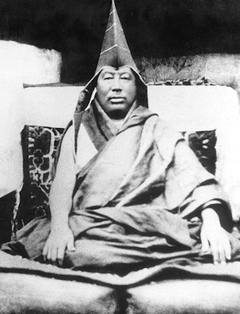It's Incredible
It's Incredible[1]
by Khenchen Ngawang Palzang
This helpful spiritual advice, worthy of the request of my vajra friends, who are like pieces of my own heart—
Hold it in your heart!
Right now, since the freedoms and advantages of our human body can be plagued by unpredictable illnesses,
You should exert yourself, with all your heart,
In training the mind in relative bodhicitta[2] and in trading happiness for suffering.[3]
Suffering spurs us to attain enlightenment.
Bad circumstances steer us into devotion.
Obstacles are dharmatā’s great ally.
Especially when hopes and fears come up, and alarm and panic,
Above you, before you, and all around,
Imagine the vidyādhara guru, Pema Tötreng Tsal,
Incandescent with mixed moods of serenity and wrath,
Sounding menacing HŪṂs and sweet songs,
Dancing in ecstatic delight.
As soon as he enters your crown chakra,
All appearances and sounds are the play of deity and mantra—
Diaphanous,[4] ephemeral, breezy,
Evanescent, and blissful—it’s amazing!
In this fresh realization of luminosity,
How can you find any sign of demonic or obstructive forces?
With all of saṃsāra and nirvāṇa embraced in the guru’s three secrets,[5]
Recite the Vajra Guru Mantra full of devotion.
E ma! It’s incredible how we relate dualistically
To great purity’s bliss!
It’s incredible how we buy into the true existence
Of suffering, which is the great unity of bliss and emptiness!
It’s incredible how we have emotional reactions
To the pains of disease, which share in the ḍākinīs’ nature!
It’s incredible how we reify objects and subjects—
Appearances that have never existed!
It’s incredible how we think that brightening and dimming
Could apply to pristine awareness, which has never been absent!
It’s incredible how we cling to meditative experiences,
Taking them for realization that has never needed to dawn!
Dharmatā has never needed to become free—
It’s incredible we think it could disappear!
In our pure subjective dimension—momentous awareness,[6]
Which is spontaneously present, luminous, and unceasing—
It is truly amazing when confused mentation, with its ebbs and flows and joys and sorrows,
Frees itself, like a snake untying its knots.
Appearances dawn without ever partaking in existence.
Unreal, empty forms, like illusions,
All have the nature of the moon's reflection on water.
So who can reject, accept, deny, or affirm them?
Like the arena of a mirage,
Within the spacious expanse where fixations have no hold,
Appearances dawn as its spectacle;
All of saṃsāra and nirvāṇa dawns as its efflorescence.
A la la ho! Lord of Secrets,[7]
Please come to rest in my mind!
| Translated by Joseph McClellan, 2024.
Bibliography
Source Texts
mKhan po ngag dgaʼ. gSung ʼbum ngag dbang dpal bzang, vol. 2, pp. 21–24. Khreng tuʼu, nd. BDRC W22946.
mKhan po ngag dgaʼ. gSung ʼbum kun mkhyen ngag gi dbang po, vol. 1, p. 113–114. sNga ʼgyur kaḥ thog bcu phrag rig mdzod chen moʼi dpe tshogs. Khreng tuʼu: Si khron mi rigs dpe skrun khang, 2017. BDRC W4CZ364088.
Secondary Sources
Ngawang Palzang. A Guide to the Words of My Perfect Teacher. Translated by Dipamkara. Boston: Shambhala, 2004.
___. Wondrous Dance of Illusion. Translated by Heidi Nevin and Jakob Leschly. Boston: Snow Lion, 2013.
Pema Chödrön. Tonglen, the Path of Transformation. Boulder: Vajradhatu Publications, 2001.
Sheehy, Michael, trans. "Guidance on Being at Ease with Illusion." Lotsawa House, 2021. https://www.lotsawahouse.org/tibetan-masters/longchen-rabjam/gyuma-ngalso-wish-fulfilling-gem
Thondup, Tulku. Buddha Mind: An Anthology of Longchen Rabjam’s Writings on Dzogpa Chenpo. Ithaca: Snow Lion, 1989.
Thubten Jinpa. Mind Training: The Great Collection. Boston: Wisdom Publications, 2014.
Version: 1.1-20241205
-
This title has been added by the translator. ↩
-
From Khenpo Ngaga’s Guide to the Words of My Perfect Teacher: “Relative bodhichitta is aroused and dissolves with our thoughts, whereas absolute bodhichitta is that state of primal wisdom in which all the movements that are conceptual thought have subsided into the absolute space. Relative bodhichitta has two aspects: intention and application. Bodhichitta in intention is to pledge ourselves to the result. Bodhichitta in application is to pledge ourselves to the cause, that is, to wish to accomplish the six transcendent perfections that are the cause or means for attaining that result. Each of these two pledges, my teacher said, must be backed by a second iron resolution” (155). ↩
-
The practice of Tonglen (gtong len). See Pema Chödrön. Tonglen, the Path of Transformation (Boulder: Vajradhatu Publications, 2001). ↩
-
“Ethereal” for khral ma khrol, which has been glossed as “unobstructed,” “unhindered,” and “non-defined.” Tulku Thondup glosses it somewhat technically in his translation of Longchenpa’s Twenty-Seven Courses of Training in Dzogpa Chenpo: "One does not concentrate on the aspect of emptiness but contemplates on the state of self-clarity without apprehension of the percepts, clearly, vividly, and vigorously. Then the realization of undefining (perceptions or not defined appearances) (I) arises, in which all phenomena appear without being apprehended” (Thondup, Buddha Mind, 309). Michael Sheehy has glossed it as "evanescent due to seemingly having holes or being porous" ("Guidance on Being at Ease with Illusion"). Along these same lines, we have opted for "diaphanous." ↩
-
Three Secrets (gsang ba gsum)—an honorific term for an enlightened being’s body, speech, and mind. ↩
-
“Momentous awareness” for rig pa che (“great rigpa”). Che is by far the most common adjective in Tibetan, and while it could almost always be translated with “great,” that shuts the door on many rich English synonyms. Here, the term is not particularly technical; “awareness” is simply being marked as something special and valuable. Alternatively, the Sanskrit term mahāvidyā could be used to give it an even loftier feel. ↩
-
Lord of Secrets (gsang ba’i bdag) usually refers to Vajrapāṇi (phyag na rdo rje). ↩
